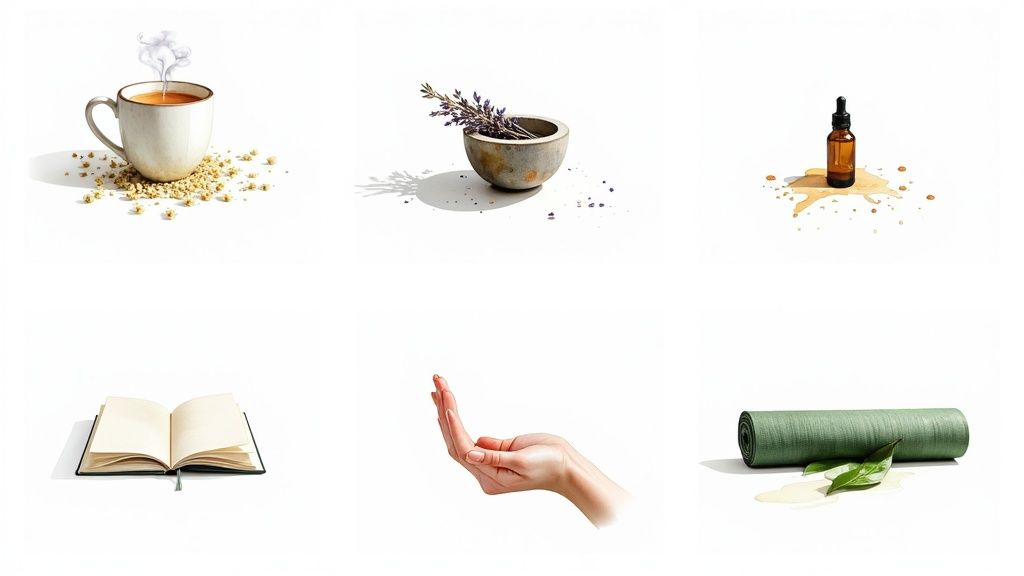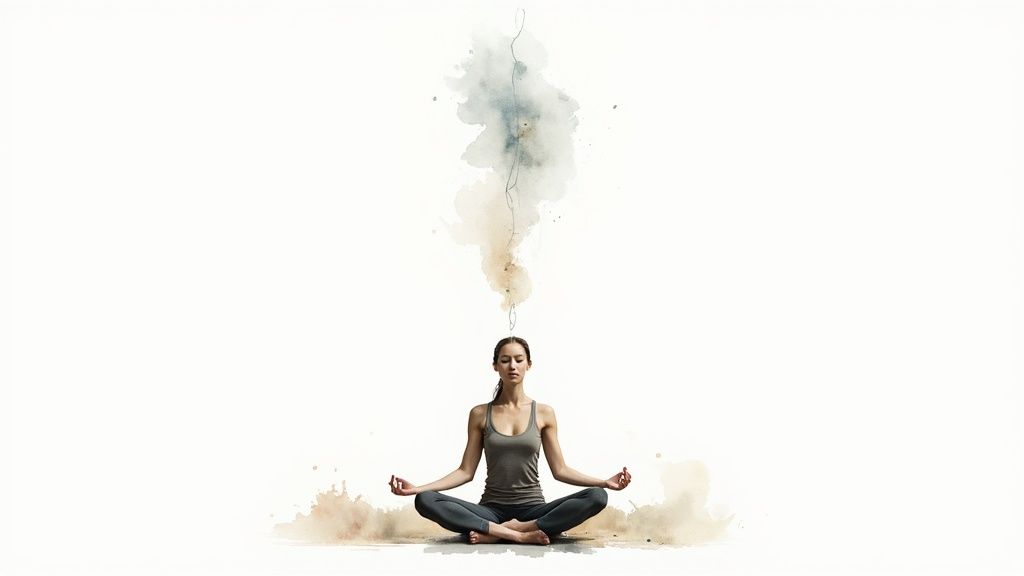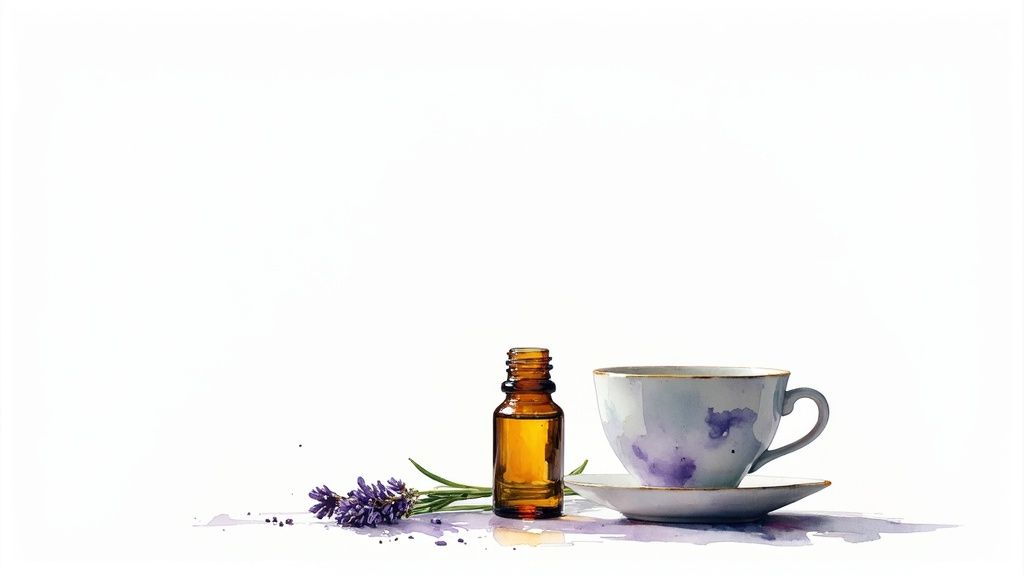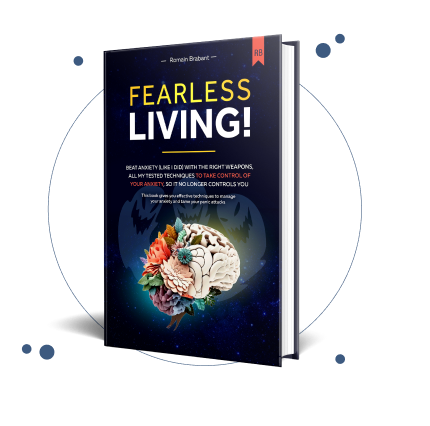
The constant hum of anxiety and the weight of chronic stress can feel like an inescapable cycle, making a calm, panic-free life seem like a distant, unattainable dream. But hope is not just a feeling; it is a tangible strategy, and this guide is your roadmap. For every racing thought, tightened chest, or sudden wave of panic, there are powerful, science-backed natural remedies for anxiety and stress that can help you reclaim control and find solid ground. This is your first step on a hopeful path forward, a path that leads to healing and a life free from panic.
This guide moves beyond generic advice to offer a practical, actionable toolkit for genuine healing. We will explore 10 specific, evidence-based remedies designed to provide more than just temporary relief; they are foundational practices for building lasting resilience and well-being. From potent herbal supplements like Ashwagandha to accessible mind-body techniques, each item is presented with clear instructions for implementation. You will learn not just what works, but precisely how to integrate these strategies into your daily life. The journey from just surviving with anxiety to actively thriving without it is entirely possible, and it begins with these concrete steps. A life defined by peace, not panic, is achievable.
1. Ashwagandha
Ashwagandha (Withania somnifera) is a cornerstone of Ayurvedic medicine, revered for its ability to enhance resilience against stress. As an adaptogenic herb, it doesn’t just mask symptoms; it helps stabilize the body's physiological processes and promotes balance, empowering your system to heal. This powerful herb works by modulating the hypothalamic-pituitary-adrenal (HPA) axis, your body’s central stress response system.
By regulating cortisol levels, the primary stress hormone, Ashwagandha helps calm the nervous system. This action leads to a significant reduction in feelings of anxiety and overwhelm, offering a clear pathway toward a more serene and panic-free state without causing drowsiness. It's a key tool in the arsenal of natural remedies for anxiety and stress, showing that healing is possible.
Who Can Benefit?
This herb is particularly effective for those experiencing chronic stress and anxiety. For instance, a corporate professional might use it to manage the pressure of tight deadlines, while an athlete could use it to combat performance anxiety before a big competition. It provides foundational support that can help individuals feel more in control on their healing journey.
Practical Tips for Use
To integrate Ashwagandha effectively and safely into your routine, consider these actionable steps:
- Choose Wisely: Opt for a high-quality, standardized extract containing at least 5% withanolides, the active compounds responsible for its benefits.
- Consistency is Key: Take it consistently every day, rather than only when you feel stressed. Full benefits often become noticeable after 6-8 weeks of regular use.
- Enhance Absorption: Consume your supplement with a meal that contains healthy fats to improve bioavailability.
- Amplify Effects: For a powerful mind-body approach, combine your daily Ashwagandha routine with a short meditation practice to maximize feelings of calm.
For those interested in exploring this and other similar options, you can discover more about naturopathic anxiety treatments on AnxietyChecklist.com.
2. Meditation, Mindfulness, and Breathwork
Meditation and mindfulness are transformative practices for cultivating present-moment awareness, which directly counters the future-focused worry that fuels anxiety. These techniques work by activating the parasympathetic nervous system, your body's "rest and digest" mode, which helps lower cortisol levels and rewires the neural pathways associated with your stress response. By grounding you in the now, they offer a clear and hopeful path to healing from anxiety and living a more panic-free life.

When combined with specific breathwork techniques, such as diaphragmatic breathing or the 4-7-8 method, you gain an immediate tool for vagal nerve stimulation and rapid anxiety relief. While meditation builds long-term resilience and fosters deep healing, intentional breathing provides an in-the-moment anchor, making this combination one of the most effective natural remedies for anxiety and stress.
Who Can Benefit?
These practices are universally beneficial. Military and first responders use tactical breathing to stay calm under extreme pressure, while schools teach mindfulness to help students manage test anxiety. In clinical settings, therapists use breathwork to guide patients through panic attacks, demonstrating that it is possible to regain control and find peace.
Practical Tips for Use
To integrate these mind-body practices effectively and build lasting calm, consider these actionable steps:
- Start Small: Begin with just 5 minutes of guided meditation daily. Consistency is more important than duration, especially when forming a new habit that leads to healing.
- Use Guided Apps: For beginners, apps like Headspace, Calm, or Insight Timer provide structure and make it easier to start and stay on track.
- Deploy Tactical Breathing: When you feel a surge of anxiety, immediately use the 4-7-8 breathing technique for rapid relief. Inhale for 4 seconds, hold for 7, and exhale for 8.
- Combine and Amplify: Begin your meditation session with a few rounds of intentional breathwork to settle your nervous system, enhancing the overall effect.
In addition to breathwork and mindfulness, practices like Swedish massage therapy can also be effective in reducing anxiety and stress. For those interested in a deeper dive, you can explore more specific breathing exercises for anxiety.
3. L-Theanine
L-Theanine is a unique amino acid predominantly found in green tea leaves, celebrated for its ability to promote relaxation without causing drowsiness. It works by crossing the blood-brain barrier and influencing brain function, notably by increasing alpha brain waves associated with a state of "wakeful relaxation." This powerful amino acid also helps boost levels of calming neurotransmitters like GABA, serotonin, and dopamine, fostering a sense of well-being.
By enhancing these neurochemicals, L-Theanine helps quiet an overactive mind and fosters a sense of calm focus. This effect can be felt relatively quickly, often within 30-60 minutes, making it a valuable tool for acute stress and offering a hopeful pathway toward a more stable, panic-free state of mind. It stands out among natural remedies for anxiety and stress for its gentle yet effective action.
Who Can Benefit?
This amino acid is ideal for individuals who need to stay alert and focused while managing stress. A student could take it before a major exam to reduce jitters, while a public speaker might use it to ease performance anxiety before a presentation. It provides clear-headed calmness that helps anyone perform effectively under pressure, proving that anxiety doesn't have to hold you back.
Practical Tips for Use
To integrate L-Theanine effectively and safely into your routine, consider these actionable steps:
- Start Small: Begin with a dose of 100-200 mg to assess your individual tolerance and response.
- Timing is Everything: For situational anxiety, take it approximately 30-60 minutes before a known stressful event.
- Create Synergy: Combine L-Theanine with a small amount of caffeine (like that in a cup of green tea) to enhance focus and cognitive performance while mitigating caffeine's potential jitteriness.
- Consider Natural Sources: For those interested in this amino acid's role in calm alertness, you can explore the health benefits of matcha powder, including L-theanine, which offers a natural and potent source.
4. Regular Exercise and Movement
Regular physical activity is a powerful, science-backed intervention for taking control of your mental health. More than just a distraction, exercise actively combats anxiety by releasing mood-boosting endorphins, reducing the stress hormone cortisol, and promoting neuroplasticity for a more resilient brain. It provides a healthy and immediate outlet for nervous energy, making it a foundational tool among natural remedies for anxiety and stress.
This physiological reset helps decrease your baseline anxiety levels and addresses the root vulnerability to stress. By engaging in consistent movement, you are actively retraining your nervous system to be less reactive. This process offers a tangible sense of control and empowerment, showing you that it is absolutely possible to heal from anxiety and live a full, panic-free life.
Who Can Benefit?
Movement is universally beneficial, especially for those who feel trapped in a cycle of anxious thoughts. A student overwhelmed by exam pressure can use a daily run to clear their head, while someone in a recovery program might incorporate yoga to reconnect with their body in a positive way. It’s an accessible and empowering first-line treatment for nearly everyone.
Practical Tips for Use
To make exercise a sustainable and effective part of your anxiety management plan, follow these steps:
- Find Your Joy: Choose an activity you genuinely enjoy, whether it's dancing, hiking, or swimming. This ensures you'll stick with it long-term.
- Start Small: Begin with just 15-20 minutes a day and gradually increase the duration or intensity. Consistency is more important than intensity on the path to healing.
- Move in the Morning: A morning workout can set a calm and positive tone for the entire day, lowering your anxiety baseline before daily stressors begin.
- Seek Social Support: Join a group fitness class or find a workout partner. The combination of social connection and accountability can dramatically improve results.
For those looking to build a comprehensive wellness strategy, you can explore more about lifestyle and diet changes for anxiety management on AnxietyChecklist.com.
5. Passionflower (Passiflora)
Passionflower (Passiflora incarnata) is a gentle yet effective botanical, traditionally used for centuries to soothe the nervous system and quiet an anxious mind. This climbing vine works primarily by increasing levels of a neurotransmitter called gamma-aminobutyric acid (GABA) in the brain. Higher GABA levels inhibit brain activity, leading to a natural state of relaxation and reduced anxiety, opening the door to peace.
Studies have shown that its calming effects can be comparable to some conventional anti-anxiety medications, but without the associated risks of dependency. This makes it a valuable and sustainable tool in the toolkit of natural remedies for anxiety and stress, offering a hopeful path toward tranquility and a life free from constant panic.
Who Can Benefit?
Passionflower is especially beneficial for those with generalized anxiety, nervous restlessness, or anxiety-related insomnia. For example, a student facing exam stress might use a passionflower tincture to calm their nerves before a test. It is also an excellent option for individuals seeking to gently transition away from pharmaceutical anxiolytics under a doctor's supervision, providing a supportive step on their healing journey.
Practical Tips for Use
To integrate passionflower effectively and safely into your anxiety management plan, consider these steps:
- Optimal Timing: For generalized anxiety, take it consistently throughout the day. For sleep-related issues, consume it about an hour before bedtime.
- Brewing Technique: If using dried passionflower for tea, steep it in hot water for at least 10 minutes with a lid on the cup to ensure the volatile oils are retained.
- Synergistic Blends: Combine it with other calming herbs like lemon balm or chamomile in a tea or tincture to amplify its sedative and anxiety-reducing effects.
- Patience is Key: While some effects may be felt quickly, allow 3-4 weeks of consistent use to assess its full benefits for your nervous system. Healing is a process, and this herb supports it gently.
For those interested in exploring this and other similar options, you can discover more about naturopathic anxiety treatments on AnxietyChecklist.com.
6. Magnesium Supplementation
Magnesium is an essential mineral that plays a crucial role in over 300 biochemical reactions in the body, including the regulation of your nervous system. It acts as a gatekeeper for NMDA receptors, which are involved in brain development, memory, and learning. By preventing these receptors from being overstimulated, magnesium helps maintain a state of calm and reduces neural excitability.
When the body is deficient in this vital mineral, it can lead to heightened anxiety, irritability, and an inability to cope with stress. Supplementation works to restore this balance, promoting relaxation and supporting a stable mood. This makes it a foundational element in any toolkit of natural remedies for anxiety and stress, offering a clear path to feeling more grounded and panic-free.
Who Can Benefit?
Magnesium is especially beneficial for individuals whose anxiety is linked to a dietary deficiency, which is surprisingly common. For example, someone with a diet high in processed foods might see rapid improvement after starting supplementation. Athletes also use it to ease muscle tension and improve recovery, while those with chronic pain may find it helps reduce the anxiety associated with their condition, fostering hope for relief.
Practical Tips for Use
To integrate magnesium supplementation effectively and safely into your routine, consider these actionable steps:
- Choose Wisely: Opt for magnesium glycinate, a highly bioavailable form that is gentle on the stomach and less likely to cause a laxative effect.
- Test, Don't Guess: Consider a red blood cell (RBC) magnesium test through your doctor to check for a true deficiency, as standard serum tests can be misleading.
- Enhance Absorption: Take your supplement with a meal to improve absorption and minimize any potential digestive discomfort.
- Amplify Effects: Combine magnesium with vitamin B6, as this vitamin helps your body effectively absorb and utilize magnesium within your cells.
7. Lavender (Lavandula)
Lavender (Lavandula) is a fragrant herb widely recognized for its calming properties, making it a staple in aromatherapy and traditional European herbalism. Its therapeutic effects stem from active compounds like linalool and linalyl acetate, which influence the nervous system. When inhaled, these molecules interact with the brain's limbic system, the seat of emotion, to promote relaxation. Internally, standardized lavender oil extracts, such as Silexan, have been shown to modulate GABAergic neurotransmission, similar to some anti-anxiety medications, but without the risk of dependency.

This dual-action approach, working through both scent and internal chemistry, makes lavender a versatile and effective tool in the toolkit of natural remedies for anxiety and stress. Its gentle yet potent action can help quiet a racing mind and ease physical tension, offering a tangible and hopeful path toward tranquility and a life free from constant panic.
Who Can Benefit?
Lavender is ideal for those seeking immediate, situational relief from anxiety as well as long-term nervous system support. For instance, a student could diffuse lavender oil for 20 minutes before an exam to calm test anxiety. Similarly, someone struggling with anxiety-related insomnia might place a lavender sachet under their pillow to help ease into a restful sleep, demonstrating its practical use in reclaiming peace in daily life.
Practical Tips for Use
To harness the full potential of lavender for anxiety and stress management, consider these actionable steps:
- Choose Wisely: For aromatherapy, select a 100% pure, therapeutic-grade essential oil. For internal use, look for a clinically studied, standardized oral preparation like Silexan.
- Combine Methods: For a comprehensive effect, use both aromatherapy and an internal supplement. Diffuse the oil during the day and take the oral supplement daily for chronic anxiety.
- Targeted Aromatherapy: Diffuse the essential oil for 15-20 minutes before a known stressful event, like a presentation or difficult conversation, to preemptively manage anxiety.
- Enhance Sleep: Place a few drops of lavender oil on a tissue or use a dried lavender sachet inside your pillowcase to promote relaxation and improve sleep quality.
8. Nature Exposure and Ecotherapy
Nature Exposure, often termed Ecotherapy, is the practice of immersing oneself in natural environments to foster mental and emotional well-being. This powerful remedy taps into our innate connection to nature, known as biophilia, to calm the nervous system. The simple act of spending time outdoors can lower cortisol levels, reduce blood pressure, and activate the parasympathetic nervous system, which is your body's "rest and digest" mode.

The practice, popularized by the Japanese tradition of shinrin-yoku or "forest bathing," offers a direct path to reducing anxious thoughts and finding a sense of peace. It's a key natural remedy for anxiety and stress because it combines gentle physical activity with profound psychological restoration, demonstrating that healing can be as simple and hopeful as stepping outside and reconnecting with the earth.
Who Can Benefit?
This approach is ideal for anyone feeling disconnected or overwhelmed by urban life. For example, a student facing exam stress can find mental clarity during a walk in a local park, while a remote worker could use a daily gardening session to combat feelings of isolation. Nature exposure provides a vital reset button for a stressed-out mind, offering hope and renewal.
Practical Tips for Use
To integrate nature exposure effectively and safely into your routine, consider these actionable steps:
- Start Small: Begin with just 20 minutes in a natural setting and gradually increase the duration as you feel comfortable.
- Engage Your Senses: Intentionally notice the sights, sounds, and smells around you. Feel the breeze, touch the leaves, and listen to the birds.
- Minimize Distractions: Leave your phone on silent or at home to fully immerse yourself in the experience.
- Enhance the Effect: Combine your time in nature with other mindfulness practices. You can learn more about how nature helps with grounding techniques for anxiety.
9. Bacopa Monnieri (Brahmi)
Bacopa monnieri, also known as Brahmi, is a staple herb in Ayurvedic tradition celebrated for enhancing cognitive function and reducing anxiety. As a powerful adaptogen, it helps the mind adapt to stressful situations by promoting calmness and mental clarity. Its mechanism involves modulating key neurotransmitters like GABA and serotonin while also protecting the brain from oxidative stress.
This unique herb works by enhancing communication between brain cells, which can improve memory and focus. By supporting neuroplasticity and reducing the impact of stress on the brain, Bacopa monnieri offers a hopeful pathway to a more resilient and panic-free mind. It's an excellent addition to the toolkit of natural remedies for anxiety and stress, particularly when cognitive fog accompanies anxiety.
Who Can Benefit?
This herb is ideal for individuals whose anxiety impacts their cognitive performance. For example, a student struggling with test anxiety could use it to improve both memory recall and calmness under pressure. Similarly, a professional experiencing stress-related cognitive decline might find it helps restore mental sharpness and emotional balance, empowering them to thrive.
Practical Tips for Use
To integrate Bacopa monnieri effectively and safely into your routine, consider these actionable steps:
- Choose Wisely: Select a high-quality extract standardized to at least 50% bacosides, the active compounds responsible for its benefits.
- Consistency is Key: Full cognitive and anxiolytic effects typically emerge after 8-12 weeks of consistent daily use, so patience is crucial.
- Enhance Absorption: Bacopa is fat-soluble, so take your supplement with a meal containing healthy fats like avocado or nuts to improve bioavailability.
- Amplify Effects: For a synergistic approach, consider combining Bacopa with B-complex vitamins to further support neurotransmitter function and overall brain health.
10. Cognitive Behavioral Therapy (CBT) – Self-Directed
Cognitive Behavioral Therapy (CBT) is a powerful, evidence-based approach that addresses the root causes of anxiety. It operates on the principle that your thoughts, feelings, and behaviors are interconnected, and that by changing negative thought patterns, you can change your emotional state and heal. Self-directed CBT makes these life-altering tools accessible through workbooks, apps, and online courses.
This method empowers you to become your own therapist by teaching you to identify, challenge, and reframe the distorted thoughts that fuel anxiety. By systematically changing your thought processes and behaviors, you can break the cycle of fear and worry. This approach is a cornerstone among natural remedies for anxiety and stress, offering a structured, hopeful path to regain control and live panic-free.
Who Can Benefit?
Self-directed CBT is ideal for individuals seeking a proactive, structured way to manage anxiety on their own terms. For example, a student struggling with social anxiety can use an app like MindShift to practice gradual social exposure, while a new parent experiencing overwhelming worry can use a workbook to challenge catastrophic thinking and restore a sense of calm and hope.
Practical Tips for Use
To integrate self-directed CBT effectively and build lasting resilience, consider these actionable steps:
- Start with Awareness: Begin by using a thought record to identify your automatic negative thoughts when you feel anxious. Note the situation, the thought, and the resulting emotion.
- Challenge Your Thoughts: Actively question the validity of your anxious thoughts. Ask yourself: "What is the evidence for this thought? Is there a more balanced, hopeful perspective?"
- Practice Gradual Exposure: Create an "exposure hierarchy" by listing your fears from least to most intimidating. Systematically and gradually face these fears to prove to yourself that you can handle them.
- Schedule Positive Activities: Use behavioral activation by intentionally scheduling enjoyable and meaningful activities, even when you don't feel like it, to counteract withdrawal and improve your mood.
For those considering professional guidance, you can explore various therapeutic options and learn more about how psychotherapy can help with anxiety.
Comparison of 10 Natural Remedies for Anxiety & Stress
| Item | Implementation Complexity 🔄 | Resource Requirements ⚡ | Onset / Timeframe ⚡ | Expected Outcomes ⭐📊 | Ideal Use Cases 💡 |
|---|---|---|---|---|---|
| Ashwagandha | 🔄🔄 (standardization & dosing choices) | ⚡ (affordable supplements: capsules/powder) | ⚡ 4–8 weeks | ⭐⭐📊 Moderate anxiety reduction (~25–29%); improves sleep and stress resilience | Chronic stress, lifestyle-managed anxiety; combine with meditation |
| Meditation, Mindfulness & Breathwork | 🔄🔄 (skill-building, consistency) | ⚡ (minimal; apps or teacher optional) | ⚡ Immediate (breathwork) + cumulative benefits w/ practice | ⭐⭐⭐📊 Immediate calming; long-term baseline anxiety reduction; neuroplastic changes | Situational anxiety, ongoing stress management, adjunct to therapy |
| L-Theanine | 🔄 (simple dosing) | ⚡ (low-cost supplement) | ⚡ 30–40 minutes; effects ~4–6 hours | ⭐⭐📊 Rapid situational anxiety relief; enhances calm focus and reduces caffeine jitters | Exams, presentations, travel, acute performance anxiety |
| Regular Exercise & Movement | 🔄🔄 (planning + consistency) | ⚡⚡ (time investment; low monetary cost) | ⚡ Immediate post-exercise boost (2–4 hrs); long-term baseline reduction with weeks/months | ⭐⭐⭐📊 Strong evidence for anxiety reduction, improved sleep and resilience | Lifestyle intervention for chronic anxiety; social or nature-based programs |
| Passionflower (Passiflora) | 🔄 (simple but quality varies) | ⚡ (teas/tinctures/capsules low-cost) | ⚡ 2–4 weeks | ⭐⭐📊 Clinical reductions for mild–moderate anxiety; helpful for insomnia | Anxiety-related insomnia; mild anxiety alternatives to pharmaceuticals |
| Magnesium Supplementation | 🔄 (choose form & monitor interactions) | ⚡ (low-cost; testing adds cost) | ⚡ Days to 2–4 weeks | ⭐⭐📊 Reduces deficiency-related anxiety; improves sleep and muscle relaxation | Individuals with poor dietary intake, muscle tension, sleep disturbances |
| Lavender (Lavandula) | 🔄 (multiple delivery methods to consider) | ⚡ (aromatherapy low-cost; standardized extracts costlier) | ⚡ Aromatherapy immediate; oral extracts 2–4 weeks | ⭐⭐📊 Clinically effective for mild–moderate anxiety; some trials comparable to anxiolytics | Situational anxiety (diffusion/topical) and chronic mild anxiety (oral extract) |
| Nature Exposure & Ecotherapy | 🔄 (low complexity; scheduling needed) | ⚡ (minimal; location-dependent) | ⚡ Immediate (20–30 min) with cumulative benefits | ⭐⭐📊 Measurable physiological stress reductions (e.g., cortisol ↓ up to ~16%) | Urban dwellers, low-cost mood boost, combine with walking or gardening |
| Bacopa Monnieri (Brahmi) | 🔄🔄 (use standardized extracts for consistency) | ⚡ (supplement purchase) | ⚡ 4–8 weeks | ⭐⭐📊 Cognitive enhancement plus anxiety reduction (~27% in studies) | Students, cognitive concerns with stress, adjunct adaptogen for chronic stress |
| CBT — Self-Directed | 🔄🔄🔄 (active engagement, homework) | ⚡⚡ (apps/books inexpensive; therapist increases cost) | ⚡ 8–12 weeks (self-directed) | ⭐⭐⭐📊 High efficacy (60–80% for anxiety disorders); durable skill acquisition | Root-cause treatment for anxiety; motivated self-learners or adjunct to therapy |
Your Personalized Path to Fearless Living Begins Now
Navigating the landscape of anxiety and stress can feel isolating, but as this guide has shown, you are surrounded by powerful, natural allies. You are not alone, and healing is possible. We've explored a comprehensive toolkit, moving from the ancient wisdom of adaptogenic herbs like Ashwagandha and Bacopa Monnieri to the calming neuroscience behind L-Theanine and Magnesium. Each remedy represents a unique pathway toward tranquility and resilience.
The journey to a panic-free life is not about finding a single, perfect solution. Instead, it is about empowerment. It’s about recognizing that you have the ability to create a personalized mosaic of strategies that resonate with your body and mind. True healing begins when you intentionally combine these tools into a consistent, supportive daily practice, taking back control one step at a time.
Key Takeaways for Lasting Change
The most profound insight from these natural remedies for anxiety and stress is that small, consistent actions create monumental, life-changing shifts over time.
- Mind-Body Synergy: Remedies like regular exercise, breathwork, and nature exposure highlight the undeniable link between physical well-being and mental calm. You cannot treat one without acknowledging the other.
- Biochemical Balance: Supplements such as Magnesium and L-Theanine, along with botanicals like Passionflower and Lavender, offer a way to gently support your brain's natural calming mechanisms, reducing the physiological "noise" of anxiety.
- Cognitive Reframing: Self-directed Cognitive Behavioral Therapy (CBT) empowers you to dismantle the thought patterns that fuel anxiety, giving you direct control over your internal narrative. This is perhaps the most crucial skill for long-term freedom from panic.
Your Actionable Next Steps
Mastering these concepts is not an academic exercise; it is the practical work of reclaiming your life from the grip of fear. It’s about transforming passive hope into active healing. The ultimate benefit is not just the absence of panic but the presence of joy, confidence, and the freedom to live without a constant sense of dread. A life of peace is waiting for you.
To begin this hopeful journey, select just one or two remedies from this list that feel most accessible and appealing to you. Perhaps it's a 10-minute morning walk in a green space or brewing a cup of Passionflower tea in the evening. The goal is not immediate perfection but sustainable progress. Track how you feel. Notice the subtle changes. Each positive step, no matter how small, is a victory that builds momentum toward a fearless, fulfilling life. You have the tools, the knowledge, and the innate capacity to heal. Your path forward begins with the very next choice you make.
Ready to transform these insights into a structured, daily action plan? The Anxiety Checklist is a system designed to help you integrate these natural remedies for anxiety and stress into a cohesive and effective routine, guiding you step-by-step toward a panic-free life. Discover the framework that turns knowledge into lasting healing at The Anxiety Checklist.

